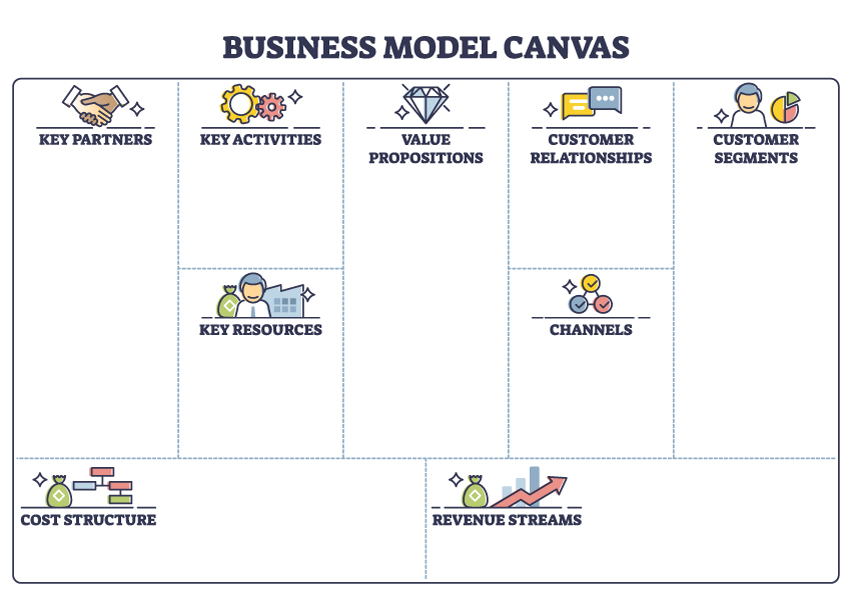Back when mobiles phones were simply basic handheld devices predominantly used for calls only, Blackberry emerged with an innovative larger screen and keyboard design that changed the way we would converse forever.
However, when other competitors began rising to the challenge in a bid to stay relevant, Blackberry failed to further adapt its business model as the market evolved, and they soon found themselves left behind as touchscreen smartphones became the talk of the town.
This is just one of thousands of similar scenarios where brands at the top of their market have struggled to experiment and keep up with the rapid changes in their industry.
In this article, I’ll discuss how business model experimentation can help companies like yours avoid ending up in the same position, and instead work to expand and accelerate your business’ growth.
You just have to think beyond your current horizons. Here’s how.

What is your business model?
Your business model pertains to the way your business monetises its assets and resources through a value proposition. Your value proposition is what your company promises to deliver to your customers and stakeholders. Examples of business models include retail, franchising, and subscription-based services.
In the case of Blackberry, their business model was based on designing, manufacturing and marketing wireless solutions, with a specific focus on the business client. They saw great success when they introduced the QWERTY keyboard onto their mobile phones, along with an instant messaging platform and the most sophisticated operating system at the time.
Unfortunately for Blackberry, however, their business model collapsed when they failed to further experiment and adapt in line with the changing demands of their market.
This story is all too common. As a Business Coach, I often work with companies that have an outdated or unsuitable business model. It’s often not their fault. It’s just many of them believe that choosing a business model is a one-time decision, and there’s no need to revisit this decision in the future.
However, this can compromise the value of their business over time.

Why should your organisation try experimenting with your business model?
Disney is a long-standing and reputable brand. Its model was primarily involved with creating movies and earning the revenue generated from these.
However, since the introduction of Disney Plus in 2019, which shifted their business to a subscription model, Disney’s shares price climbed from $138 to $177 in the space of just a few months and has been climbing ever since.
This is the power of business model experimentation.
A stagnant business model can hold you back. While it may seem daunting to look for new ways to innovate and stay relevant in the market, especially if this requires seeking investors for financial backing, revamping your business model can increase your company’s visibility and legitimacy and overall value.
The most successful businesses regularly experiment with their business model to align with the changing market landscape, trends and demands. By tapping into the evolving needs of your customers, you can help your business to increase:
- Profitability
- Efficiency
- Value
- Resilience against the competition
How to experiment with your business model
Business leaders like you can find proactive ways to improve your business model by looking at your assets.
Your core assets are the tangible or intangible properties of your business, such as trademarks, intellectual properties, machinery, affiliates or subsidiaries.
Let’s use Apple as an example. Originally a producer of desktop computers, they saw an opportunity in the market with the assets they had and capitalised on it as part of their business model experimentation. Not only did they bring us iTunes, the iPod and the iPhone, but they also branched out into other markets as well, with products such as the Apple Watch, AirPods, iPads and more.
They also transformed part of their business into a subscription-based model, offering services such as Apple TV, Apple Music, and iCloud. All of this has enabled them to build a large group of advocates, ready to purchase the newest products as they’re released – no matter the cost.
To help in experimenting with your business model, start by asking yourself these questions:
- If I am a service business, can I turn my services into a product?
- If I am a service business, can I turn my services into a subscription?
- Is there specific knowledge within my business that could be valuable to somebody else?
- Can my business become a platform or a marketplace?
- Is there a way I could disintermediate my industry?
- How could I find resellers for my business’ products?
Reviewing these questions can help give you an idea of what your business could possibly look like in the next 10-15 years.
As a forward-thinking business owner and leader, the ability to keep up with the evolving and growing demand of the market is a distinct advantage that will help you achieve even bigger and better things.

Do you need help experimenting with your business model?
While it’s important to experiment with your business model, this action requires careful analysis and planning. At Growth Workshop, I can help you avoid costly mistakes while transforming your business to reach its full potential.
Whether you need to re-evaluate your business’ core beliefs or you’re looking for a comprehensive plan to help you experiment with the assets you have to offer, I’m ready to lend a hand.
As a Business Coach and Mentor, I work with business owners like you to guide you on the path towards achieving your business goals.
Simply schedule an initial discovery call today with me.
Stephen O’Sullivan
Get the Right Advice from Growth Workshop
Get your business off to a great start with one-on-one personal coaching with Growth Workshop’s Business Freedom Coaching.
